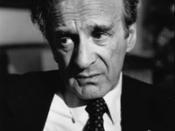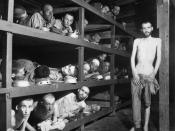A young boy is shot through the head. Infants are mercilessly murdered while women and children are incinerated and brought down to earth as ashes. Can we forget this? Do we forgive it? It is but human nature to remember what has happened and learn from it. It is hard to forget the horrifying experiences of Elie Wiesel as depicted in his book Night, exposing a young boy to the agonizing death of his family, faith, and innocence in Jewish death camps. Schindler's List, another story in the form of a movie produced by Steven Spielberg, illustrates the transformation of a German profiteer into a passionate man. The three main characters in Night and Schindler's List represent the unwilling forgiver as Elie Wiesel, the forgiven as Oskar Schindler and the barbaric murderer as Amon Goeth.
Night begins with Elie Wiesel expressing interest and intense faith in the Jewish religion and their God.
By the end of his agonizing experience in Nazi death camps, his faith was virtually gone. The first camp Wiesel came to was the receiving camp for Auschwitz known as Birkenau. While he and his father were walking through the camp, they saw hundreds of dead Jews piled in ditches and huge fires fueled by human flesh. Wiesel's father was praying. "For the first time, I felt revolt rise up in me. Why should I bless His name? The Eternal, Lord of the Universe, the All-Powered and Terrible, was silent. What had I to thank him for?" (Night 31) The biggest part of Elie Wiesel's life began to deteriorate. Wiesel began to question his faith in God whom he formerly believed to be the epitome of good. Wiesel lost the motivation to fulfill His expectations. Elie Wiesel does not understand why God could allow six crematories to...


